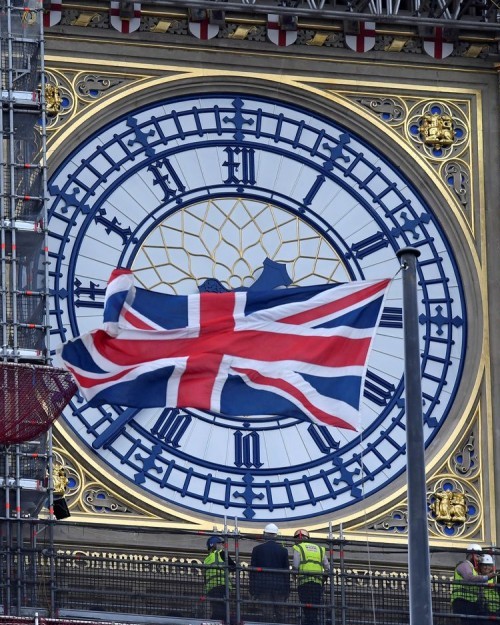|
[Majorityrights Central] An approaching moment of Russian clarity Posted by Guessedworker on Sunday, 11 May 2025 12:34. [Majorityrights Central] “It’s started. You ignored us. See where it’s going to get you.” Posted by Guessedworker on Sunday, 04 May 2025 00:42. [Majorityrights News] Another dramatic degradation of Russia’s combat capacity Posted by Guessedworker on Wednesday, 23 April 2025 08:49. [Majorityrights Central] A British woman in Ukraine and an observer of Putin’s war Posted by Guessedworker on Monday, 14 April 2025 00:04. [Majorityrights News] France24 puts an end to Moscow’s lie about the attack on Kryvyi Riy Posted by Guessedworker on Monday, 07 April 2025 17:02. [Majorityrights News] If this is an inflection point Posted by Guessedworker on Thursday, 03 April 2025 05:10. [Majorityrights News] Sikorski on point Posted by Guessedworker on Friday, 28 March 2025 18:08. [Majorityrights Central] Piece by peace Posted by Guessedworker on Wednesday, 19 March 2025 08:46. [Majorityrights News] Shame in the Oval Office Posted by Guessedworker on Saturday, 01 March 2025 00:23. [Majorityrights News] A father and a just cause Posted by Guessedworker on Tuesday, 25 February 2025 23:21. [Majorityrights Central] Into the authoritarian future Posted by Guessedworker on Friday, 21 February 2025 12:51. [Majorityrights Central] On an image now lost: Part 2 Posted by Guessedworker on Saturday, 15 February 2025 14:21. [Majorityrights News] Richard Williamson, 8th March 1940 - 29th January 2025 Posted by Guessedworker on Monday, 03 February 2025 10:30. [Majorityrights Central] Freedom’s actualisation and a debased coin: Part 2 Posted by Guessedworker on Saturday, 11 January 2025 01:08. [Majorityrights News] KP interview with James Gilmore, former diplomat and insider from first Trump administration Posted by Guessedworker on Sunday, 05 January 2025 00:35. [Majorityrights Central] Aletheia shakes free her golden locks at The Telegraph Posted by Guessedworker on Saturday, 04 January 2025 23:06. [Majorityrights News] Former Putin economic advisor on Putin’s global strategy Posted by Guessedworker on Monday, 30 December 2024 15:40. [Majorityrights News] Trump will ‘arm Ukraine to the teeth’ if Putin won’t negotiate ceasefire Posted by Guessedworker on Tuesday, 12 November 2024 16:20. [Majorityrights News] Olukemi Olufunto Adegoke Badenoch wins Tory leadership election Posted by Guessedworker on Saturday, 02 November 2024 22:56. [Majorityrights News] What can the Ukrainian ammo storage hits achieve? Posted by Guessedworker on Saturday, 21 September 2024 22:55. [Majorityrights Central] An Ancient Race In The Myths Of Time Posted by James Bowery on Wednesday, 21 August 2024 15:26. [Majorityrights Central] Slaying The Dragon Posted by James Bowery on Monday, 05 August 2024 15:32. [Majorityrights Central] The legacy of Southport Posted by Guessedworker on Friday, 02 August 2024 07:34. [Majorityrights News] Farage only goes down on one knee. Posted by Guessedworker on Saturday, 29 June 2024 06:55. [Majorityrights News] An educated Russian man in the street says his piece Posted by Guessedworker on Wednesday, 19 June 2024 17:27. [Majorityrights Central] Freedom’s actualisation and a debased coin: Part 1 Posted by Guessedworker on Friday, 07 June 2024 10:53. [Majorityrights News] Computer say no Posted by Guessedworker on Thursday, 09 May 2024 15:17. [Majorityrights News] Be it enacted by the people of the state of Oklahoma Posted by Guessedworker on Saturday, 27 April 2024 09:35. [Majorityrights Central] Ukraine, Israel, Taiwan … defend or desert Posted by Guessedworker on Sunday, 14 April 2024 10:34. [Majorityrights News] Moscow’s Bataclan Posted by Guessedworker on Friday, 22 March 2024 22:22. [Majorityrights News] Soren Renner Is Dead Posted by James Bowery on Thursday, 21 March 2024 13:50. [Majorityrights News] Collett sets the record straight Posted by Guessedworker on Thursday, 14 March 2024 17:41. [Majorityrights Central] Patriotic Alternative given the black spot Posted by Guessedworker on Thursday, 14 March 2024 17:14. [Majorityrights Central] On Spengler and the inevitable Posted by Guessedworker on Wednesday, 21 February 2024 17:33. Majorityrights News > Category: Political analysisChristopher Caldwell | The Roots of Our Partisan Divide
Polish vs Nazi anti-Semitism: Poles sought nationalist separatism; Nazis sought nationless race war.
“Enjoy The Moment” - Mancinblack  A Union Jack flag flutters in front of Big Ben as workers inspect one of its clocks, in London on Sept 11. (Reuters photo) A Union Jack flag flutters in front of Big Ben as workers inspect one of its clocks, in London on Sept 11. (Reuters photo)
Matthew Goodwin | Social and economic origins of populism UBS Center, 30 Dec 2019 Matthew Goodwin on populism: is it economics or culture? UBS Center, 13 Nov 2019
Nation Revisited# 159 January 2020 By Bill Baillie Tory Landslide
Some background: “Stabbing the Empire”: Last Days of Soviet Union BELARUSIAN NATIONALISM, A WHITE NATIONALISM ASSASSINATION OF LUKASHENKO’S BELARUSIAN NATOINALIST OPPOSITION: Now for the update:
Part 8, concluding introduction to an ongoing series to critique and separate WN from Hitler/Nazism
Patriotic Weekly Review, Episode 32: Mark Collett with special guest Secret Sources AKA Dionne Moller. They discuss Tommy Robinson, viz., his disingenuous activities as controlled opposition. Collett was prompted to this critique having been criticized, ridiculed and denounced explicitly by Tommy Robinson (including being publicly and harshly criticized by Robinson on the day of Collett’s daughter’s birth; and subsequently by Robinson in the video shown below, as one who didn’t but should be having babies; while in fact Collett is fathering). Laura Towler weighs-in against Tommy Robinson, as well, addressed by him in the same diatribe as “some bird” who should be having sex and making babies rather than merely hating fecund migrants - particularly the Muslims, who Tommy Robinson’s controlled opposition wants to focus on, with minimal criticism of other non English migrants, and no criticism of Jewish peoples.
Page 4 of 27 | First Page | Previous Page | [ 2 ] [ 3 ] [ 4 ] [ 5 ] [ 6 ] | Next Page | Last Page |
|

Existential IssuesDNA NationsCategoriesContributorsEach author's name links to a list of all articles posted by the writer. LinksEndorsement not implied. Immigration
Islamist Threat
Anti-white Media Networks Audio/Video
Crime
Economics
Education General
Historical Re-Evaluation Controlled Opposition
Nationalist Political Parties
Science Europeans in Africa
Of Note MR Central & News— CENTRAL— An approaching moment of Russian clarity by Guessedworker on Sunday, 11 May 2025 12:34. (View) Piece by peace by Guessedworker on Wednesday, 19 March 2025 08:46. (View) Into the authoritarian future by Guessedworker on Friday, 21 February 2025 12:51. (View) — NEWS — If this is an inflection point by Guessedworker on Thursday, 03 April 2025 05:10. (View) Sikorski on point by Guessedworker on Friday, 28 March 2025 18:08. (View) Shame in the Oval Office by Guessedworker on Saturday, 01 March 2025 00:23. (View) CommentsGuessedworker commented in entry 'Militia Money' on Wed, 21 May 2025 06:41. (View) James Bowery commented in entry 'Militia Money' on Tue, 20 May 2025 01:01. (View) Guessedworker commented in entry 'Militia Money' on Mon, 19 May 2025 16:32. (View) James Bowery commented in entry 'Militia Money' on Sun, 18 May 2025 16:07. (View)  
|